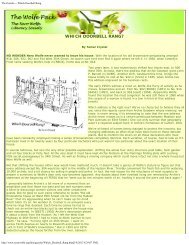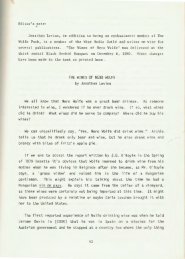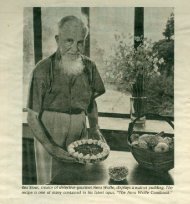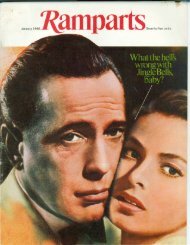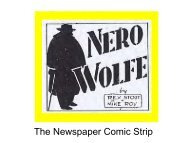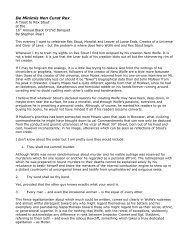The Gazette -- Nero and the Performing Arts - Wolfe Pack
The Gazette -- Nero and the Performing Arts - Wolfe Pack
The Gazette -- Nero and the Performing Arts - Wolfe Pack
Create successful ePaper yourself
Turn your PDF publications into a flip-book with our unique Google optimized e-Paper software.
<strong>The</strong> <strong>Gazette</strong> -- <strong>Nero</strong> <strong>and</strong> <strong>the</strong> <strong>Performing</strong> <strong>Arts</strong><br />
<strong>Nero</strong> <strong>Wolfe</strong> And <strong>the</strong><br />
<strong>Performing</strong> <strong>Arts</strong><br />
by Margaret Goodman<br />
AS SOME OF YOU MAY KNOW, I HAVE A very special relationship with <strong>the</strong> subject of <strong>Nero</strong> <strong>Wolfe</strong> <strong>and</strong> <strong>the</strong><br />
performing arts. First, this is because I'm "in <strong>the</strong> business," as <strong>the</strong>y say. A second reason is that shortly after joining <strong>the</strong> <strong>Wolfe</strong><br />
<strong>Pack</strong>, Marjorie Mortenson asked me to participate in <strong>the</strong> realization of her long-suppressed desire: to stage <strong>the</strong> scene from Death<br />
of a Doxy in which Julie Jaquette, <strong>the</strong> nightclub singer, assaults <strong>Nero</strong> <strong>Wolfe</strong> with song. Ano<strong>the</strong>r <strong>Wolfe</strong> <strong>Pack</strong> member, Virginia<br />
Gilbertson, was enlisted to set Julie's song, "Big Man, Go Go" to music. Robert Hughes <strong>and</strong> Gregory Vieisades appeared as <strong>Nero</strong><br />
<strong>and</strong> Archie, respectively. Archie himself describes this encounter as "one of <strong>the</strong> most impressive floor shows <strong>the</strong> old brownstone<br />
has ever seen." <strong>The</strong>re are certainly no o<strong>the</strong>r episodes in <strong>the</strong> Corpus where we are presented with so complete a libretto or with<br />
<strong>the</strong> opportunity to see a performer in action. <strong>The</strong>re are, however, an amazing number <strong>the</strong> performing arts, <strong>and</strong> even novels in<br />
which some area of performance is central to <strong>the</strong> plot. For those who are statistically minded, <strong>the</strong>re are only three novels <strong>and</strong><br />
fourteen stories which have no reference whatsoever to <strong>the</strong>ater, music, radio, television, or film.<br />
Julie Jaquette is, I think, one of <strong>the</strong> most delightful of Stout's performer creations. Not only does she know how to make an<br />
unforgettable entrance but, as we know, she loves orchids, she can recite <strong>the</strong> alphabet backwards <strong>and</strong> she calls Mr. <strong>Wolfe</strong> "<strong>Nero</strong>."<br />
She has a proper appreciation for Fritz's hedgehog omelette <strong>and</strong>, in spite of <strong>the</strong> fact that she is earning about $1,000 a week as a<br />
nightclub headliner, she helps nail <strong>the</strong> murderer so she can get $50,000 to go to college. Actually, in 1966 when <strong>the</strong> novel takes<br />
place, it didn't cost $50,000 even to go through an Ivy League college, so she must have had some o<strong>the</strong>r plans for part of <strong>the</strong><br />
money!<br />
To continue with nightclubs, since we've started in that area, Archie comments in Death of a Doxy that he's seen quite a few of<br />
<strong>the</strong> Manhattan spots, mostly with Lily Rowan. For this report I will not include a complete rundown of all Archie's nightclub visits,<br />
but I will touch upon o<strong>the</strong>r nightclub performers. <strong>The</strong> only o<strong>the</strong>r major nightclub character in <strong>the</strong> Corpus is Jewel Jones in diel -<br />
again, notice a "J.J." Of course, Julie Jaquette's real name was Amy Jackson <strong>and</strong> Jewel Jones is really Mrs. Meegan, but if anyone<br />
has any <strong>the</strong>ories at to why Rex Stout was drawn to "J.J." for nightclub names, I would be interested in hearing. Ano<strong>the</strong>r nightclub<br />
performer included in diel,Jerome Al<strong>and</strong>, has <strong>the</strong> distinction of being disliked by a Labrador retriever, a unique accomplishment in<br />
my experience. <strong>The</strong>n we have Jimmy Vail of FINL who "had made a big splash at <strong>the</strong> Glory Hole in <strong>the</strong> Village with a thirty-minute<br />
turn of personal chatter, pointed comments on everyone <strong>and</strong> everything," <strong>and</strong> who dies under a statue of Benjamin Franklin.<br />
Finally <strong>the</strong>re is Dora Basssett (nee Miller) in AFAM, whose name change to Doraymee didn't help her singing career so that she<br />
was forced (!) to go into TV commercials.<br />
B<strong>and</strong>s are referred to in detail mainly in non-nightclub situations. Champaign for One features a b<strong>and</strong> at <strong>the</strong> party in <strong>the</strong><br />
Grantham mansion, consisting of a piano, sax, two violins, clarinet, <strong>and</strong> traps. <strong>The</strong> b<strong>and</strong>leader, "a guy with broad shoulders <strong>and</strong> a<br />
square jaw," comes in h<strong>and</strong>y later as <strong>the</strong> person Archie correctly identifies as someone who is willing to call <strong>the</strong> cops in spite of<br />
Mrs. Robilotti's comm<strong>and</strong>s to <strong>the</strong> contrary. At ano<strong>the</strong>r party at Lily's place (rode), we have piano <strong>and</strong> fiddles playing "<strong>The</strong>se Fences<br />
Don't Belong." And in Death of a Dude, Monroe County, Montana provides us with a violin, an accordion, <strong>and</strong> a sax playing<br />
"Horsey, Keep Your Tail Up." (Incidentally, if ei<strong>the</strong>r of <strong>the</strong>se three musical masterpieces is real <strong>and</strong> if anyone knows <strong>the</strong>m, I think<br />
<strong>the</strong>y certainly should be featured at some future <strong>Wolfe</strong> <strong>Pack</strong> event!)<br />
<strong>The</strong> very first mention of <strong>the</strong> performing arts in <strong>the</strong> <strong>Wolfe</strong> saga occurs right away in Fer-de-Lance <strong>and</strong>, appropriately enough for<br />
1933, it is <strong>the</strong> radio. Since this is perhaps <strong>the</strong> only place that we encounter <strong>Wolfe</strong> "enjoying" a performance, I think it's worth<br />
reading <strong>the</strong> entire section:<br />
'<strong>Wolfe</strong> was as nice as pie that evening. I [Archie] got home in time to eat dinner with him. He wouldn't let me say<br />
anything about White Plains until <strong>the</strong> meal was over; in fact, <strong>the</strong>re wasn't any conversation to speak of about<br />
anything, for he had <strong>the</strong> radio going. He was accustomed to say that this was <strong>the</strong> perfect era for <strong>the</strong> sedentary man;<br />
formerly such a man could satisfy any amount of curiosity regarding bygone times by sitting down with Gibbon or<br />
Ranke or Tacitus or Greene but if he wanted to meet his contemporaries he had to take to <strong>the</strong> highways, whereas<br />
<strong>the</strong> man of today, tiring for <strong>the</strong> moment of Galba or Vitellius, had only to turn on <strong>the</strong> radio <strong>and</strong> resume his chair.<br />
One program <strong>Wolfe</strong> rarely missed was <strong>the</strong> Joy Boys. I never knew why. He would sit with his fingers interlaced on his<br />
belly, his eyes half closed, <strong>and</strong> his mouth screwed up as if <strong>the</strong>re was something he would spit out any minute.<br />
Frequently I went for a walk at that time . . . I have my radio favorites all right, but <strong>the</strong> Joy Boys seem to me pretty<br />
damn vulgar.'<br />
By <strong>the</strong> time of <strong>The</strong> Red Box three years later, <strong>Wolfe</strong> has added ano<strong>the</strong>r program, "<strong>The</strong> Pearls of Wisdom Hour" to his "favorites."<br />
He says to Archie:<br />
I purposely dial <strong>the</strong> station which will later develop into <strong>the</strong> Pearls of Wisdom, <strong>and</strong> I deliberately bear it. It's discipline. It fortifies<br />
me to put up with ordinary inanities for days. I gladly confess that after listening to <strong>the</strong> Pearls of Wisdom, your conversation is an<br />
intellectual <strong>and</strong> es<strong>the</strong>tic delight.<br />
http://www.nerowolfe.org/htm/gazette/<strong>Nero</strong>_<strong>and</strong>_<strong>the</strong>_performing_arts.htm[3/8/2013 8:31:10 PM]
<strong>The</strong> <strong>Gazette</strong> -- <strong>Nero</strong> <strong>and</strong> <strong>the</strong> <strong>Performing</strong> <strong>Arts</strong><br />
Near <strong>the</strong> end of FERD, <strong>and</strong> also in LEAG, Archie again refers to <strong>Wolfe</strong> keeping <strong>the</strong> radio going all through dinner, behavior which<br />
will be particularly interesting when we consider his attitude toward television. In RANG we learn that <strong>the</strong>re is a radio in <strong>the</strong> office<br />
<strong>and</strong> in <strong>the</strong> dining room, <strong>and</strong> in SLNT <strong>Wolfe</strong> makes a specific reference: I heard Raymond Swing on <strong>the</strong> radio this evening; I know<br />
what's happening."<br />
Archie's relationship to <strong>the</strong> radio is primarily as something to wake up by. In GOLD he tells us that his bedside clock radio is<br />
normally set for 7:30, but on this particular morning it is set for 6:30 <strong>and</strong> unfortunately wakes him with "one of those goddam<br />
cheerful morning jamborees." Between 1953 <strong>and</strong> 1961 he's sleeping later <strong>and</strong> his taste has improved. In FINL he sets <strong>the</strong> radio<br />
for 8:00 AM <strong>and</strong> WQXR (one of New York's leading classical music stations), though he tells us that it's for <strong>the</strong> news bulletins.<br />
A radio program is central to <strong>the</strong> plot of course in ANDB, where we have <strong>the</strong> murder occurring on <strong>the</strong> air, perpetrated as it turns<br />
out by <strong>the</strong> star of <strong>the</strong> show. <strong>The</strong>re is, <strong>the</strong>refore, an enormous amount of material about <strong>the</strong> broadcasting field in this novel, but I<br />
will confine myself to <strong>the</strong> conflicting opinions about Madeline Fraser's work that we get from Archie <strong>and</strong> <strong>Wolfe</strong>.<br />
From Archie we hear ". . . <strong>the</strong>re was no getting away from it that Eraser was good. Her voice was good, her timing was good, <strong>and</strong><br />
even when she was talking about White Birch Soap you would almost as soon leave it on as turn it off." And from <strong>Wolfe</strong>: "I mean<br />
<strong>the</strong> purpose she allows her cleverness to serve. That unspeakable prepared biscuit flour! Fritz <strong>and</strong> I have tried it. Those things she<br />
calls Sweeties! Pfui! And that salad dressing abomination - we have tried that too, in an emergency. What <strong>the</strong>y do to stomachs<br />
heavens knows, but that woman is ingeniously <strong>and</strong> deliberately conspiring in <strong>the</strong> corruption of millions of palates. She should be<br />
stopped!"<br />
In COOK <strong>the</strong> turning on of a radio is <strong>the</strong> signal for a murder, <strong>and</strong> in BOOK we have a radio tuned to WNBC - first "Life of Riley"<br />
<strong>and</strong> <strong>the</strong>n to Bill Stern – as <strong>the</strong> background accompaniment to a murder. In SCND we have <strong>Wolfe</strong> asking for, <strong>and</strong> getting as a fee,<br />
<strong>the</strong> removal from <strong>the</strong> air of a news commentator, Paul Emerson. (I confess that this always struck me as a little petty since all<br />
<strong>Wolfe</strong> has to do is not turn on his radio in order not to be annoyed. It reminds me of my own fa<strong>the</strong>r who used to turn on <strong>the</strong><br />
"Today" show every morning apparently just so Barbara Walters could send him into a towering rage by <strong>the</strong> time <strong>the</strong> rest of us got<br />
up!) In RBOX <strong>the</strong> radio is turned on full blast to <strong>the</strong> b<strong>and</strong> of <strong>the</strong> Hotel Portl<strong>and</strong> Surf Room m order to cover "any sound of voices<br />
that might come from <strong>the</strong> hall as <strong>Wolfe</strong> escorted his guest from <strong>the</strong> elevator to <strong>the</strong> front room." Finally, in "<strong>The</strong> Squirt <strong>and</strong> <strong>the</strong><br />
Monkey" we have Archie dealing with two radios going full blast at <strong>the</strong> same time, which he says made his brain start to curdle.<br />
As <strong>the</strong> years pass, television comes to <strong>the</strong> office on West 35th Street <strong>and</strong> we get repeated descriptions of <strong>Wolfe</strong>'s feelings. In<br />
Fa<strong>the</strong>r Hunt Archie says, "<strong>The</strong> television was on <strong>and</strong> he was st<strong>and</strong>ing in <strong>the</strong> middle of <strong>the</strong> room glaring at it. Presumably he had<br />
been so riled that he had picked on <strong>the</strong> one thing <strong>the</strong>re that would rile him more,"<br />
In GOLD we hear, "<strong>Wolfe</strong> was in <strong>the</strong> office looking at television, which gives him a lot of pleasure. I have seen him turn it on as<br />
many as eight times in one evening, glare at it from one to three minutes, turn it off, <strong>and</strong> go back to his book." We get more<br />
specific information from MIDN: "It was Sunday evening, when he especially enjoyed turning <strong>the</strong> television off. Of course he has<br />
to turn it on first, intermittently throughout <strong>the</strong> evening, <strong>and</strong> that takes a lot of exertion, but he has provided for it by installing a<br />
remote control panel at his desk. That way he can turn off as many as twenty programs in an evening without overdoing." Finally,<br />
in PASS, "<strong>Wolfe</strong> shook his head. I turn on <strong>the</strong> television rarely, only to confirm my opinion of it."<br />
Archie's only exposition of his own feelings are in SLPT: "I have no TV favorites, because most of <strong>the</strong> programs seem to be<br />
intended for ei<strong>the</strong>r <strong>the</strong> under-brained or <strong>the</strong> over-brained <strong>and</strong> I come in between, but if I had, 'Show Your Slip' wouldn't Be one<br />
of <strong>the</strong>m. It it's one of yours, you can assume you have more brains than I have, <strong>and</strong> what I assume is my own affair." And later,<br />
"I kept my eyes on 'We're Asking You' clear to <strong>the</strong> end. I didn't learn much. <strong>The</strong>y were asking what to do about extra-bright<br />
children, <strong>and</strong> since I didn't have any <strong>and</strong> intended to stay as far away as I could from those I had seen <strong>and</strong> heard on TV <strong>and</strong> in<br />
<strong>the</strong> movies, I wasn't concerned."<br />
From PASS we know that Archie also has a color set in his room, <strong>and</strong> from RANG that Fritz had one in his den. <strong>The</strong> latter is put to<br />
good use by <strong>Wolfe</strong> <strong>and</strong> Archie to frustrate possible electronic eavesdropping.<br />
Television provides us with a number of characters. In PASS it is <strong>the</strong> vice president of a TV network who has been murdered by<br />
ano<strong>the</strong>r network employee. <strong>The</strong>re are three TV producers identified: Raymond Thorne in Fa<strong>the</strong>r Hunt; Leo Bingham in MAMA; <strong>and</strong><br />
Jerome Arkoff in DEAD. Carol Berk, a "TV contact specialist," whatever that is, gets taken out for food <strong>and</strong> drink by Archie at <strong>the</strong><br />
end of home, in spite of <strong>the</strong> fact that: a) on first viewing he considered her a borderline case on <strong>the</strong> question of whe<strong>the</strong>r it was a<br />
pleasure to look at her or not; <strong>and</strong> b) she later called him "a crummy little stooge."<br />
I find two television performers in <strong>the</strong> Corpus: Sylvia Venner in Please Pass <strong>the</strong> Guilt <strong>and</strong> Dick Vetter in "Fourth of July Picnic."<br />
Again note <strong>the</strong> similar names. (In <strong>the</strong> same family we also have Malcolm Vedder, a Broadway actor, in "Disguise for Murderr.")<br />
Possibly my favorite mention of TV in <strong>the</strong> Corpus is in In <strong>the</strong> Best Families:<br />
...as I sat in <strong>the</strong> semi-darkness scowling at a cosmetic commercial, some obscure sense told me that danger was approaching <strong>and</strong><br />
I jerked my head around. It was right <strong>the</strong>re at my elbow: a Doberman Pinscher, looking larger than normal in that light, staring<br />
intently past me at <strong>the</strong> screen.<br />
Mrs. Rackham... spoke hastily <strong>and</strong> loudly above <strong>the</strong> noise of <strong>the</strong> broadcast.<br />
'Don't try to pat him!'<br />
'I won't,' I said emphatically.<br />
'He'll behave,' she assured me. ‘He loves television.’<br />
And later in <strong>the</strong> same scene, Archie analyzes TV’s effect on his work.<br />
http://www.nerowolfe.org/htm/gazette/<strong>Nero</strong>_<strong>and</strong>_<strong>the</strong>_performing_arts.htm[3/8/2013 8:31:10 PM]
<strong>The</strong> <strong>Gazette</strong> -- <strong>Nero</strong> <strong>and</strong> <strong>the</strong> <strong>Performing</strong> <strong>Arts</strong><br />
Television is raising hell with <strong>the</strong> detective business. It used to be that a social evening at someone’s house or<br />
apartment was a fine opportunity for picking up lines <strong>and</strong> angles, moving around, watching <strong>and</strong> talking <strong>and</strong><br />
listening; but with a television session you might as well be home in bed. You can’t see faces, <strong>and</strong> if someone does<br />
make a remark you can’t hear it unless it’s a scream, <strong>and</strong> you can’t even start a private inquiry, such as finding out<br />
where a young widow st<strong>and</strong>s now on skepticism. In a movie <strong>the</strong>ater at least you can hold h<strong>and</strong>s.<br />
Movies come in for <strong>the</strong>ir fair share of attention in <strong>the</strong> <strong>Wolfe</strong> saga. Archie goes to <strong>the</strong> movies, suggests going to <strong>the</strong> movies, or<br />
threatens to go to <strong>the</strong> movies more than a dozen times (four times in Fer-de-Lance alone!). We never know <strong>the</strong> names of <strong>the</strong><br />
films, but we do get a lot of movie star names tossed around. For <strong>the</strong> record <strong>the</strong>re appear to be 22 cinema actors/actresses<br />
identified in <strong>the</strong> Corpus:<br />
In Black Orchids, of course, we have <strong>the</strong> famous scene where<br />
Archie resents being referred to as a ten-cent Clark Gable. He<br />
thinks of himself as more like Gary Cooper.<br />
Going to <strong>the</strong> movies is used as an alibi twice (Too Many<br />
Clients, Too Many Women), <strong>and</strong> in help <strong>the</strong> threatening note<br />
which begins <strong>the</strong> story is clipped from a movie ad. Only two<br />
movies are mentioned by name: "<strong>The</strong> Best Years Of Our Lives"<br />
in Too Many Women <strong>and</strong> "Coleoptera" in A Right to Die. Only<br />
one fictional character is or was involved in movie- making:<br />
Mrs. Claire Horan in Golden Spiders was a former movie<br />
actress.<br />
As is appropriate for a body of work set in New York, <strong>the</strong><br />
greatest number of references by far are to <strong>the</strong> legitimate<br />
<strong>the</strong>ater. <strong>The</strong>re are thirteen specific references to playwrights,<br />
<strong>and</strong> eight of <strong>the</strong>se are to Shakespeare. <strong>The</strong>re is one more if we<br />
count Dr. Vollmer's reference to <strong>the</strong> "Lady Macbeth syndrome"<br />
(Please Pass <strong>the</strong> Guilt), ano<strong>the</strong>r still if we include Hattie Annis's<br />
assertion that <strong>Wolfe</strong> would do fine for Falstaff ("Counterfeit for<br />
Murder"), <strong>and</strong> yet ano<strong>the</strong>r if we count Malcolm Vedder's<br />
reflections on O<strong>the</strong>llo <strong>and</strong> strangling ("Disguise for Murder").<br />
We could also add ano<strong>the</strong>r, perhaps <strong>the</strong> most delightful of all,<br />
Llewellyn Frost's assertion in <strong>The</strong> Red Box that "<strong>the</strong> cops from<br />
<strong>the</strong> Inspector down are about as good as Fanny Brice would be<br />
for Juliet." <strong>The</strong>se add up to a gr<strong>and</strong> total of twelve references<br />
to <strong>the</strong> Bard. Four of <strong>the</strong> Shakespeare references are made by<br />
Archie, including his one-upsmanship job on <strong>Wolfe</strong> in Some<br />
Buried Caesar when <strong>Wolfe</strong> has never heard <strong>the</strong> word "prat."<br />
Archie says he's looked it up, but he doesn't tell us where, so for those you who want to know, it's from "<strong>The</strong> Merry Wives of<br />
Windsor," Act IV, Scene 2.<br />
<strong>The</strong> o<strong>the</strong>r playwrights, each of whom comes in for a single mention, are Congreve, Albee, Tennessee Williams, Sophocles, <strong>and</strong><br />
Kaufman <strong>and</strong> Hart.<br />
Broadway actors <strong>and</strong> actresses figure significantly in <strong>the</strong> Corpus. <strong>The</strong>re are fifteen characters who are Broadway performers,<br />
including one actor <strong>and</strong> one actress who are murderers, <strong>and</strong> three actresses who are murder victims. In addition, we have two<br />
producers (If Death Ever Slept, <strong>The</strong> Red Box), one author whose novel has been made into a play (<strong>The</strong> League of Frightened<br />
Men), one playwright (Plot It Yourself), two Broadway backers ("Poison a la Carte", "Eeny, Meeny, Murder, Mo"), one lyricist who<br />
averages a million dollars a year in royalties for his musicals (Plot It Yourself), <strong>and</strong> one costume designer ("Blood Will Tell").<br />
<strong>The</strong>re are passing references to people being at <strong>the</strong> <strong>the</strong>ater in four stories, in three of which <strong>the</strong>ir attendance serves as an alibi. In<br />
home Archie is told that Carol Berk is attending "Guys And Dolls" when she's really hiding in a closet. Two real actresses <strong>and</strong> roles<br />
<strong>the</strong>y were famous for are mentioned: Julie Harris in "<strong>The</strong> Lark" (Might as Well be Dead) <strong>and</strong> Lynn Fontanne in "Idiot's Delight"<br />
(Over My Dead Body). Two real Broadway <strong>the</strong>aters are mentioned: <strong>the</strong> Longacre (Might as Well be Dead) <strong>and</strong> <strong>the</strong> Majestic<br />
(Method Three for Murder). Amazingly, both are still st<strong>and</strong>ing <strong>and</strong> in use.<br />
Sardi's is mentioned twice (Fa<strong>the</strong>r Hunt, "Poison a la Carte"). Only one song from a Broadway musical is cited by name: "Oh what<br />
a beautiful mornin"' (Golden Spiders). Four times Archie mentions going to <strong>the</strong> <strong>the</strong>ater himself (<strong>The</strong> Final Deduction, Plot It<br />
Yourself, Might as Well be Dead, "Murder is No Joke"), but in only two cases do we know <strong>the</strong> name of play - one real, "<strong>The</strong> Lark"<br />
(Might as Well be Dead), <strong>and</strong> one fictional, "Thumb A Ride" ("Murder is No Joke"). We know that he was so taken with Sarah Yare<br />
in "Thumb A Ride" that he saw it four times. However, he makes no observations about "<strong>The</strong> Lark" except to supply <strong>Wolfe</strong> with<br />
<strong>the</strong> running time of <strong>the</strong> first act.<br />
Gr<strong>and</strong> operas make only a minimal number of appearances in <strong>the</strong> Corpus. Opera is central to <strong>the</strong> plot, of course, in "<strong>The</strong> Gun with<br />
Wings", which deals with <strong>the</strong> murder of a Metropolitan Opera tenor, <strong>the</strong> previous assault on him by a baritone, <strong>and</strong> <strong>the</strong> question<br />
of how a gun got to <strong>the</strong> base of Caruso's bust. In Black Mountain Archie demonstrates his Italian for <strong>Wolfe</strong>: "I picked up <strong>the</strong> bag.<br />
Andiamo." <strong>Wolfe</strong> replies, "Where <strong>the</strong> devil did you get that" To which Archie answers, "Lily Rowan, at <strong>the</strong> opera. <strong>The</strong> chorus can't<br />
get off <strong>the</strong> stage without singing it." But most important of all, in Some Buried Caesar, opera provides Lily's pet name for Archie -<br />
Escamillo.<br />
Modern music comes in for a couple of passing digs. In Death of a Dude Archie says: "A house guest at Lily's cabin might be<br />
http://www.nerowolfe.org/htm/gazette/<strong>Nero</strong>_<strong>and</strong>_<strong>the</strong>_performing_arts.htm[3/8/2013 8:31:10 PM]
<strong>The</strong> <strong>Gazette</strong> -- <strong>Nero</strong> <strong>and</strong> <strong>the</strong> <strong>Performing</strong> <strong>Arts</strong><br />
anyone from a tired-out social worker to a famous composer of <strong>the</strong> kind of music I can get along without." In "Invitation to<br />
Murder" Paul Thayer is described as "Useless . . . he composes music that no one will listen to." Later in <strong>the</strong> same story we have a<br />
more complete description: "claps <strong>and</strong> rumblings . . . screeching <strong>and</strong> squealing . . . discordant jangle . . . It sets my teeth on<br />
edge." All of <strong>the</strong> above were applied to music Paul Thayer was playing on <strong>the</strong> piano, <strong>and</strong> while we're on <strong>the</strong> subject of piano, we<br />
mustn't forget that Saul plays that instrument, a fact that we learn in Fa<strong>the</strong>r Hunt. Archie describes a lunch in which <strong>Wolfe</strong> <strong>and</strong><br />
Saul debate <strong>the</strong> question whe<strong>the</strong>r music, any music, has, or can have, an intellectual content. <strong>Wolfe</strong> said no <strong>and</strong> Saul said yes. I<br />
backed Saul because he weighs only about half as much as <strong>Wolfe</strong>, but I thought he made some very good points, which impressed<br />
me because one recent Thursday evening at his apartment he had been playing a piece by Debussy, I think it was, on <strong>the</strong> piano<br />
for Lon Cohen <strong>and</strong> me . . . <strong>and</strong> Lon had said something about <strong>the</strong> piece's intellectual force <strong>and</strong> Saul had said no music could<br />
possibly have intellectual force. He says: "She had been at <strong>the</strong> piano, probably playing Chopin preludes. That isn't just a guess; I<br />
can tell by her eyes <strong>and</strong> <strong>the</strong> way she uses her voice. Her voice sounds as if she would like to sing . . ." Finally, in "Blood Will Tell"<br />
Saul finds <strong>the</strong> critical missing tie in a piano score of Scriabin's "Vers la Flamme."<br />
Perhaps <strong>the</strong> fact that <strong>the</strong>re is considerably less music than <strong>the</strong>ater is due to <strong>Wolfe</strong>'s opinion of it. Again in "Blood Will Tell", Archie<br />
tells us, "When I mentioned <strong>the</strong> title of <strong>the</strong> privately printed book ('<strong>The</strong> Music Of <strong>The</strong> Future') he made a noise – he says all music<br />
is a vestige of barbarism.<br />
To avoid being labeled a snob, I suppose I must at least mention rodeo performers, a category that seems "iffy" to me. However,<br />
I decided to include it since <strong>the</strong>y are repeatedly referred to as "performers" <strong>and</strong> also "in costume." <strong>The</strong>y are central to <strong>the</strong> plot, of<br />
course, in rodeo, but a Madison Square Garden rodeo is also a fake alibi in "Instead of Evidence."<br />
I feel I can't leave <strong>the</strong> subject of <strong>the</strong> performing arts without special reference to <strong>the</strong> phenomenon of performers' "moonlighting,"<br />
taking outside jobs to support <strong>the</strong>mselves. In <strong>The</strong> Doorbell Rang we have two actors, Jarvis <strong>and</strong> Kirby, who are central to <strong>the</strong> plot<br />
because <strong>the</strong>y are hired to impersonate <strong>Wolfe</strong> <strong>and</strong> Archie. In "Poison a la Carte" our murderess is one of <strong>the</strong> twelve actresses hired<br />
to serve at table for <strong>the</strong> Ten for Aristology. It is explained that <strong>the</strong>y were hired through a <strong>the</strong>atrical agency because "at that time<br />
of <strong>the</strong> year [!] <strong>the</strong>re were always hundreds of young actresses out of a job glad to grab at a chance to make fifty bucks, with a<br />
good meal thrown in." Last, I like to include <strong>the</strong> intriguing all day performance which Archie attends several times at <strong>the</strong> flower<br />
show in "Black Orchids," certainly one of <strong>the</strong> more elaborate industrial shows I have ever heard of, lasting as it does for nine <strong>and</strong><br />
one-half hours!<br />
Finally, since <strong>the</strong>re are so many would-be actors in <strong>the</strong> world, it seems only right to give a nod to Lewis Hewitt in "Black Orchids."<br />
He was instrumental in <strong>the</strong> successful denouement of that opus because he was in <strong>the</strong> dramatic club at college <strong>and</strong> "always<br />
wanted to be an actor."<br />
And of course we have a near miss in Please Pass <strong>the</strong> Guilt when Dennis Copes suggests to <strong>Wolfe</strong>:<br />
'That was a good ad . . . That ad would have made a wonderful five-minute spot - you <strong>and</strong> Mrs. Odell, you right here<br />
at your desk <strong>and</strong> her st<strong>and</strong>ing with her h<strong>and</strong> on your shoulder. You would do most of <strong>the</strong> talking, with your voice.<br />
She would have been glad to pay for prime time - say ten o'clock. A much larger audience than <strong>the</strong> ad. Didn't you<br />
consider it'<br />
Needless to say, <strong>Wolfe</strong>'s answer is "No." But <strong>the</strong>n <strong>Wolfe</strong> doesn't need <strong>the</strong> validation of prime time TV to confirm what he already<br />
knows. As he says in his debut appearance, Fer-de-Lance: "I am a born actor."<br />
[ED. - <strong>The</strong> <strong>Gazette</strong> is pleased to publish this article by Maggie Goodman, which she initially presented at <strong>the</strong> Ninth Annual <strong>Nero</strong><br />
<strong>Wolfe</strong> Assembly in New York on December 5th, 1987. She is especially pleased at it's being printed since, as she says, "I feel like<br />
I've been working on it most of my life!"]<br />
©<strong>The</strong> <strong>Wolfe</strong> <strong>Pack</strong><br />
http://www.nerowolfe.org/htm/gazette/<strong>Nero</strong>_<strong>and</strong>_<strong>the</strong>_performing_arts.htm[3/8/2013 8:31:10 PM]



